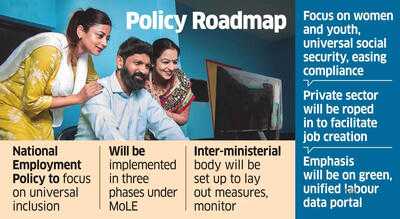The ministry of labour and employment will come up with a National Labour and Employment Policy of India, to be called Shram Shakti Niti 2025, aimed at providing universal social security to all workers, ensuring occupational safety and health, empowering women and youth, easing compliance and enhancing formalisation of workforce to help build a fair, inclusive, and future-ready labour ecosystem in the country.
Key interventions under the policy include creating a Universal Social Security Account, integrating benefits under EPFO, ESIC, PM-JAY, e-SHRAM, and state welfare board along with convergence of Skill India, NAPS, and PMKVY into a single skill-employment continuum and increase women’s participation to 35% by 2030.
Emphasis will be laid on single-window digital compliance with self certification and simplified MSME returns, promotion of green jobs and setting up of a unified national labour data architecture ensuring inter-ministerial coherence for transparent monitoring.
The ministry has sought comments on the draft policy after which it will be finalised and sent to Cabinet for approval

As per the draft, the policy will be implemented in three phases and a monitoring mechanism will be put in place to track progress on goals and timelines set under each phase.
India’s labour market is experiencing structural shifts driven by digitalisation, green transitions, and new employment forms such as gig and platform work, the ministry said in a draft policy.
"Shram Shakti Niti 2025 hopes to respond through a unified framework integrating social protection, skilling, occupational safety, and technology-led governance," it said.
Under the policy, a three-tier implementation structure will be set up for smooth implementation with an inter-ministerial body at the Centre named as National Labour and Employment Policy Implementation Council (NLPI) and chaired by the labour minister, state labour missions to ensure contextual implementation and coordination and District Labour Resource Centres (DLRCs) that will serve as single window hubs for worker registration, job matching, skilling, start-up incubation, and grievance redressal.
Phase 1 (2025-27) will focus on institutional setup and social-security integration while Phase II (2027–30) will work towards nationwide rollout of Universal Social Security Account, skill-credit systems, and district-level Employment Facilitation Cells and Phase III (Beyond 2030) will undertake consolidation of all related initiatives.
Besides, the ministry of labour and employment (MoLE) will work as an employment facilitator, enabling convergence among workers, employers, and training institutions through inter-ministerial collaborations.
The plan is to develop the National Career Service (NCS) portal as India’s Digital Public Infrastructure for Employment to serve as the technological backbone for inclusive job matching, credential verification, and skill alignment.
( Originally published on Oct 08, 2025 )
Key interventions under the policy include creating a Universal Social Security Account, integrating benefits under EPFO, ESIC, PM-JAY, e-SHRAM, and state welfare board along with convergence of Skill India, NAPS, and PMKVY into a single skill-employment continuum and increase women’s participation to 35% by 2030.
Emphasis will be laid on single-window digital compliance with self certification and simplified MSME returns, promotion of green jobs and setting up of a unified national labour data architecture ensuring inter-ministerial coherence for transparent monitoring.
The ministry has sought comments on the draft policy after which it will be finalised and sent to Cabinet for approval
As per the draft, the policy will be implemented in three phases and a monitoring mechanism will be put in place to track progress on goals and timelines set under each phase.
India’s labour market is experiencing structural shifts driven by digitalisation, green transitions, and new employment forms such as gig and platform work, the ministry said in a draft policy.
"Shram Shakti Niti 2025 hopes to respond through a unified framework integrating social protection, skilling, occupational safety, and technology-led governance," it said.
Under the policy, a three-tier implementation structure will be set up for smooth implementation with an inter-ministerial body at the Centre named as National Labour and Employment Policy Implementation Council (NLPI) and chaired by the labour minister, state labour missions to ensure contextual implementation and coordination and District Labour Resource Centres (DLRCs) that will serve as single window hubs for worker registration, job matching, skilling, start-up incubation, and grievance redressal.
Phase 1 (2025-27) will focus on institutional setup and social-security integration while Phase II (2027–30) will work towards nationwide rollout of Universal Social Security Account, skill-credit systems, and district-level Employment Facilitation Cells and Phase III (Beyond 2030) will undertake consolidation of all related initiatives.
Besides, the ministry of labour and employment (MoLE) will work as an employment facilitator, enabling convergence among workers, employers, and training institutions through inter-ministerial collaborations.
The plan is to develop the National Career Service (NCS) portal as India’s Digital Public Infrastructure for Employment to serve as the technological backbone for inclusive job matching, credential verification, and skill alignment.
( Originally published on Oct 08, 2025 )
You may also like

'No idea': Trump downplays Nobel peace prize chances; says 'they'll find a reason not to give it to me'

Cristian Romero's four-word dig at Chelsea ace shows Tottenham star's real character

Boy, 11, 'fell between tram and platform' as it started pull out of Crossacres

Indore News: Nursing Students Gain New Perspective On Sustainability

London council bans Union flags and blasts those putting them up 'far-right'






